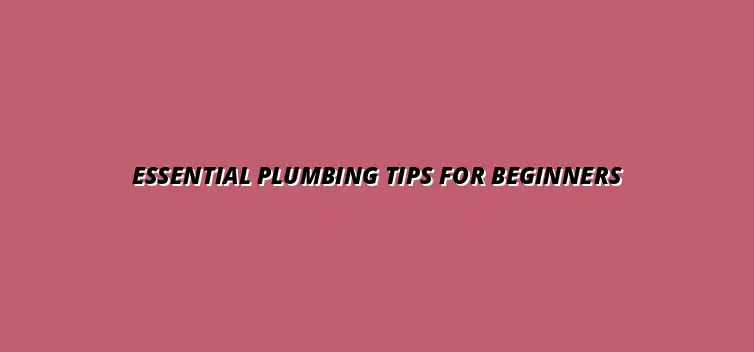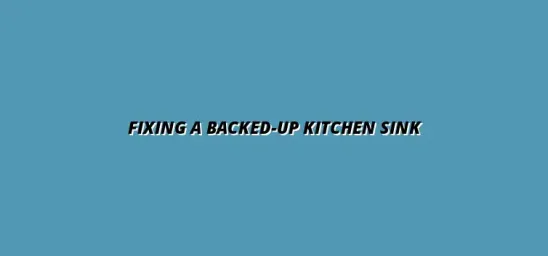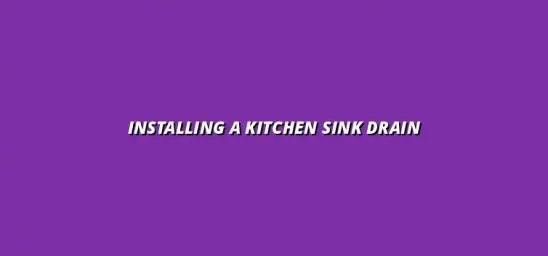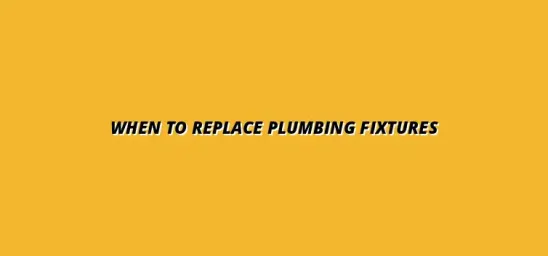
Essential Plumbing Tips for Beginners
Understanding Plumbing Maintenance for First-Time Homeowners
As a first-time homeowner, understanding plumbing maintenance is crucial for ensuring your home remains functional and comfortable. Many new homeowners might feel overwhelmed by the systems in their home, but taking the time to learn about plumbing maintenance can save you from costly repairs. Regular upkeep not only extends the life of your plumbing but also increases the overall value of your home!
Importance of Regular Plumbing Maintenance
Regular plumbing maintenance is the key to preventing unexpected issues and costly repairs. By taking proactive steps, you can identify problems early and address them before they become severe. Implementing a routine maintenance schedule can greatly enhance the longevity of your plumbing systems. For specific kitchen plumbing maintenance tips, check out this helpful resource: Plumbing Maintenance Tips for Homeowners.
Why Preventive Care Matters for Homeowners
Preventive care is all about being ahead of potential plumbing issues. By engaging in regular inspections and maintenance, homeowners can:
- Reduce the risk of major repairs: Small leaks can turn into significant issues if left unchecked.
- Improve water quality: Regular maintenance helps keep your water free of contaminants.
- Lower utility bills: Well-maintained plumbing systems operate more efficiently.
In essence, preventive care helps you avoid unnecessary stress and expenses in the long run!
Common Plumbing Issues and Their Consequences
Ignoring plumbing maintenance can lead to several common issues, including:
- Leaky faucets: These can waste gallons of water and increase your bill.
- Clogged drains: Over time, debris can accumulate, leading to slow drainage or backups. Learn how to prevent clogged drains with these key tips: Preventing Clogged Drains: Key Tips.
- Pipe corrosion: Old pipes may start to rust and leak, causing damage to your home.
Understanding these issues is the first step in preventing them. By staying vigilant and catching problems early, you can maintain a safe and efficient plumbing system.
Essential Plumbing Maintenance Tips
Now that we've established the importance of regular maintenance, let's dive into some essential plumbing maintenance tips that every homeowner should follow. Keeping your plumbing in top shape doesn't have to be complicated! With a few simple habits, you can ensure your home's plumbing system runs smoothly. For example, regular inspections are crucial, and you can find a helpful checklist here: Annual Plumbing Maintenance Checklist.
Routine Inspections and What to Look For
Conducting routine inspections is vital for identifying wear and tear in your plumbing system. During these inspections, focus on key areas such as:
- Pipes: Look for signs of leaks, corrosion, or bulging.
- Fixtures: Check faucets and showerheads for drips or water stains. Regular inspections can also help prevent plumbing leaks, as detailed here: Regular Inspections Prevent Plumbing Leaks.
- Water heater: Assess for leaks and ensure it's functioning properly. You can find essential water heater maintenance tips here: Essential Water Heater Maintenance Tips.
By paying attention to these areas, you can catch potential issues before they escalate!
Identifying Signs of Wear and Tear in Plumbing Systems
As you inspect your plumbing, recognize these signs that indicate wear and tear:
- Unusual noises, such as clanking or banging, when using water.
- Lower water pressure in faucets or showerheads.
- Visible water spots or discoloration on walls or ceilings.
If you notice any of these signs, it’s essential to investigate further or consult a plumber. For example, if you're in the Birmingham area, you can find a local plumber here: Plumber in Alcester, Birmingham.
Frequency of Home Plumbing Inspections
I suggest scheduling plumbing inspections at least once a year, or more frequently if you live in an older home. Seasonal checks, especially before winter, can help prepare your plumbing for cold weather. Staying consistent with inspections can prevent minor issues from becoming major headaches!
Water Pressure Management
Maintaining proper water pressure is crucial for the functionality of your plumbing system. Ideal water pressure typically ranges from 40 to 60 psi (pounds per square inch). If you notice fluctuations in water pressure, it might be time to investigate.
Understanding Ideal Water Pressure Levels
The right water pressure is not just about comfort; it also protects your plumbing fixtures. Too much pressure can lead to:
- Damaged pipes and fittings.
- Increased wear on appliances such as dishwashers and washing machines.
- Unsafe conditions like burst pipes.
Maintaining optimal water pressure can prolong the life of your plumbing system!
Causes and Solutions for High Water Pressure
High water pressure can be caused by a few factors, including:
- Municipal water supply issues.
- Malfunctioning pressure regulators.
- Pipe blockages or restrictions.
If you suspect high water pressure, consider installing a pressure gauge to monitor it and consult a professional plumber for solutions. Don't forget essential bathroom plumbing maintenance tips to keep everything running smoothly: Essential Bathroom Plumbing Maintenance Tips.
Maintaining Drains and Fixtures
Keeping drains and fixtures clean is essential for preventing clogs and ensuring smooth operation. Regular maintenance can save you from frustrating plumbing issues!
Best Practices for Preventing Clogs
To keep your drains flowing freely, follow these best practices:
- Use drain screens to catch hair and debris.
- Avoid pouring grease or food scraps down the sink.
- Flush drains with hot water regularly.
These simple habits can help maintain clear drains!
Regular Cleaning Techniques for Faucets and Showers
Faucets and showerheads can accumulate mineral buildup over time. To keep them clean, try these techniques:
- Soak showerheads in a vinegar solution to dissolve mineral deposits.
- Wipe down fixtures with a microfiber cloth regularly.
- Check for and replace worn-out washers and seals.
These practices will keep your plumbing fixtures in top shape and functioning properly.
Seasonal Plumbing Checks
Seasonal plumbing checks are essential for maintaining your home's plumbing system throughout the year. Different seasons bring unique challenges, so let's explore how to prepare!
Preparing Pipes for Winter: Tips for First-Time Homeowners
As winter approaches, it's crucial to protect your pipes from freezing. Consider these tips:
- Insulate exposed pipes in unheated areas.
- Let faucets drip during extremely cold temperatures.
- Seal drafts around windows and doors to maintain warmth.
Preparation can prevent costly pipe bursts!
Summer Plumbing Maintenance: Focus Areas
During the summer, focus on:
- Checking irrigation systems for leaks.
- Inspecting your sump pump before heavy rains.
- Cleaning out gutters and downspouts to prevent water overflow.
By staying proactive in summer, you can avoid water-related issues down the line!
Addressing Common Plumbing Questions for New Homeowners
Frequently Asked Questions About Plumbing Maintenance
What Should I Do if I Encounter a Plumbing Emergency?
Experiencing a plumbing emergency can be stressful, but knowing what to do can help minimize damage and keep you calm! First, it’s essential to act quickly. Here are the steps to follow:
- Turn Off the Water Supply: Locate the main water shut-off valve and turn it off to prevent further flooding.
- Assess the Situation: Determine the source of the problem; it could be a burst pipe, overflowing toilet, or a clogged drain.
- Clear the Area: Move any furniture or valuables away from the affected area to prevent damage.
- Contact a Professional: If the issue is beyond your control, call a plumber right away!
Having a plan in place for emergencies can save you time and money, so it’s a good idea to keep the contact information of a reliable plumber handy.
How Often Should I Have My Plumbing System Inspected?
Regular inspections are key to keeping your plumbing in good shape! Generally, it’s recommended that homeowners schedule a professional plumbing inspection at least once a year. However, certain situations may require more frequent checks:
- If your home is older, consider having inspections every six months.
- After major storms or flooding, inspect your plumbing for possible damage.
- If you notice changes in water pressure or hear unusual noises, schedule an inspection sooner.
Staying on top of these inspections can help identify potential problems before they turn into costly repairs.
Final Thoughts on Plumbing Care for New Homeowners
Creating a Plumbing Maintenance Schedule
Key Elements to Include in Your Maintenance Calendar
Having a plumbing maintenance schedule can significantly enhance the lifespan of your plumbing system! Here are some key elements I recommend including:
- Monthly Checks: Review your plumbing for leaks or drips, especially under sinks and around toilets.
- Quarterly Inspections: Clear out any accumulated debris from drains and test your water pressure.
- Seasonal Maintenance: Prepare your plumbing for winter by insulating pipes, and check for any summer-related issues like sprinkler systems.
By mapping out these tasks in advance, staying organized becomes much easier!
Staying Proactive: The Importance of Ongoing Education
Continuing to learn about plumbing maintenance is crucial for every homeowner! Staying informed helps you manage your plumbing system effectively and confidently. Here are a few ways to educate yourself:
- Read Books: Look for books or e-books that focus on home maintenance.
- Online Resources: Websites and YouTube channels often provide excellent tutorials on plumbing care.
- Workshops: Many local home improvement stores offer classes on DIY home repairs.
Equipping yourself with knowledge makes it easier to tackle plumbing issues and can save you money on repairs!
Empowering First-Time Homeowners for Plumbing Success
Resources for Further Learning on Home Plumbing Care
As a new homeowner, you don’t have to navigate plumbing issues alone! There are plenty of resources available to help you learn:
- Online Forums: Join forums where homeowners share experiences and tips about plumbing maintenance.
- Local Libraries: Check out books or attend workshops on home repairs.
- Plumbing Blogs: Follow blogs dedicated to home maintenance for regular tips and tricks.
These resources can provide valuable insight, helping you become more confident in managing your plumbing.
Connecting with Local Plumbing Communities and Experts
Engaging with local plumbing communities can be a great way to gain support and knowledge! Here’s how you can connect:
- Attend Local Meetups: Look for community events focused on home improvement where you can meet other homeowners and experts.
- Social Media Groups: Join Facebook groups or other online communities dedicated to plumbing and home maintenance.
- Consult Local Plumbers: Many plumbers offer free consultations; take advantage of their expertise!
Building a network can provide ongoing support and resources, making plumbing maintenance much more manageable!





Fixing a Backed-Up Kitchen Sink
Prepare Your Plumbing for Weather
Installing a Kitchen Sink Drain
When to Replace Plumbing Fixtures
Fixing a Jammed Garbage Disposal